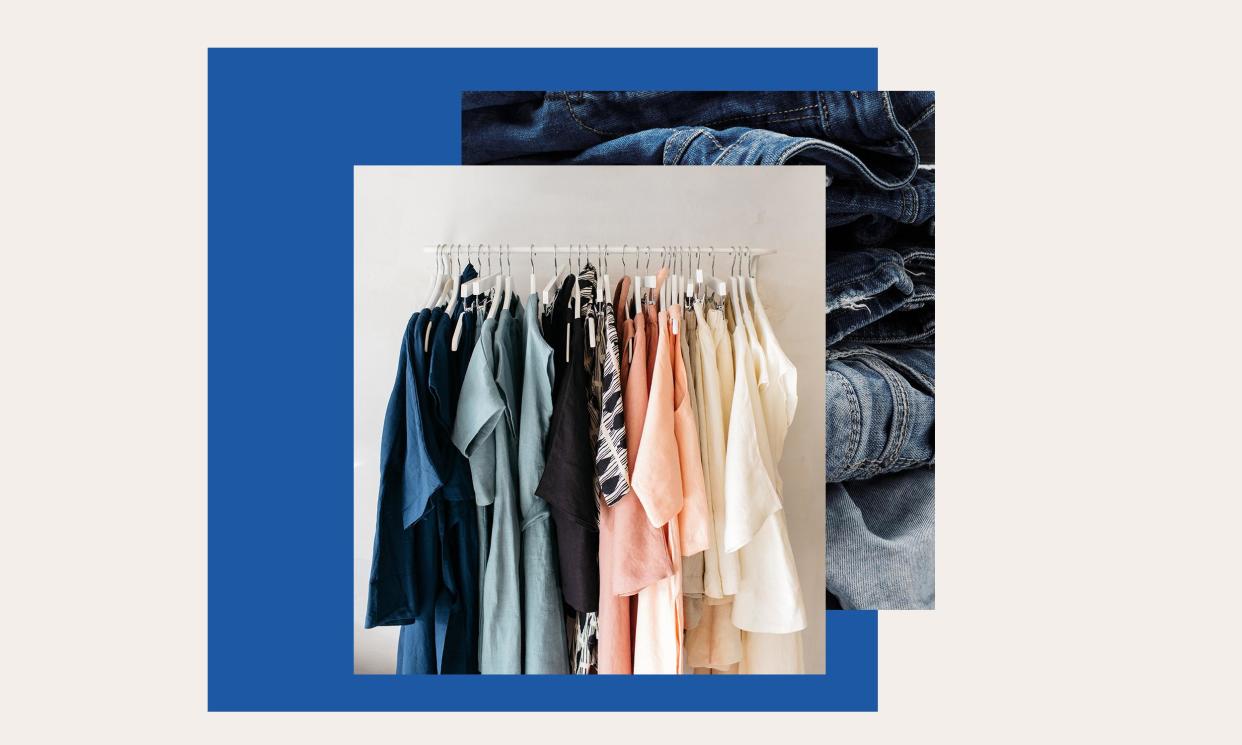Dressing sustainably: how clothing rental apps are aiming to end fast fashion

Picture this: your wardrobe updates on a monthly basis, without you ever buying a new item of clothing. Instead of giving away old pieces to make room for new ones, your wardrobe rotates; a jacket no longer needed finds a new home.
It’s a scenario likely to become reality for many of us. With the global secondhand clothing market set to grow from $28bn (£20bn) to $64bn (£46bn) by 2024, wardrobes could be largely made up of secondhand items – rented or bought.
Eshita Kabra-Davies, founder of the peer-to-peer fashion rental app By Rotation, has noticed a shift in the rental habits of her customers. “Prior to [the first] lockdown, demand was driven heavily by weddings and holidays. Now, rotators rent items for family dinners or video dates,” she says. “Renting will become a regular habit for consumers, with people focusing on a capsule wardrobe complemented by rentals.”
This is good news for the planet. Globally, almost 100bn pieces of clothing are produced each year, yet in the UK we send £140m worth of used clothing to landfill, according to the charity Wrap. As such, the fashion industry contributes to around 10% of global carbon emissions.
Platforms such as Depop make the experience of shopping secondhand accessible, inclusive and desirable
Natalie-Anne Hasseck, co-founder of the fashion rental subscription service Onloan, credits the change in consumer behaviour to a move away from status to “pleasure” dressing. During lockdown, demand for knitwear rocketed, but so did the loaning of flamboyant pieces. “The bigger the collar, the better,” she says. “We had a Mother of Pearl pie-crust collar shirt that barely touched ground in our warehouse as it just kept being rented out on repeat. Our customers care less about trends and more about identity and personalisation.”
If trends are becoming less relevant, it’s to the detriment of fast fashion, which relies on interpreting them quickly – with the promise of new items delivered on a weekly basis. “But there is a gap between what customers say and do,” says Anusha Couttigane, principal fashion analyst at market research company Kantar. “Research by Kantar shows that 34% of people try to avoid fast fashion, with 42% wanting to buy from an ethical retailer. But only 12% could name one.”
Better communication from brands is needed, as is a more unified industry approach to what constitutes a “sustainable” brand. “In our marketing materials, we promote to our customers how to live more sustainably,” says Lucy Macnamara, founder of ethical womenswear brand Aspiga. “We hosted a series of Instagram Lives with celebrities and influencers about changes we can make in our daily lives to live more eco-friendly.”
Fast fashion brands are now facing a new challenge: being less wasteful is on trend. Couttigane says she has seen an increase in the willingness to shop secondhand, largely because platforms such as Depop – a community-led marketplace, renowned for good-quality secondhand and original vintage clothes – make the experience accessible, inclusive and desirable.
“We want to use our reach to influence the way we consume fashion, encouraging people to consider secondhand first,” says Justine Porterie, Depop’s head of sustainability.
An important factor in extending the life of clothes is how we care for them. The ecological cleaning brand Ecover has relaunched its laundry detergents made with biodegradable and plant-based ingredients.
“Every 30 seconds, 1,000 items of clothing are thrown away in the UK,” says Ecover’s senior brand manager Charlotte Snelgrove. “We want to challenge the nation to wash right, wear more and waste less.”
Find out more at ecover.com/depop

 Yahoo Movies
Yahoo Movies 
